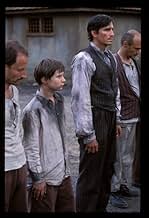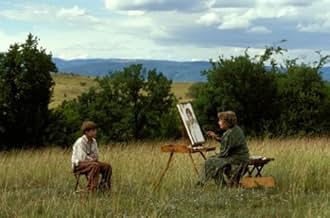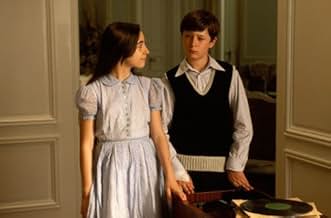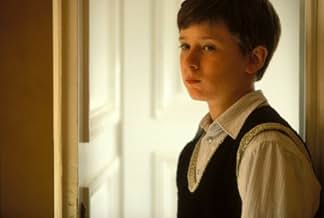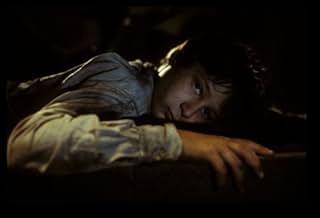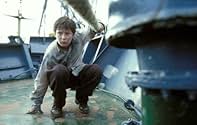I Am David
- 2003
- Tous publics
- 1h 30min
NOTE IMDb
7,1/10
8,4 k
MA NOTE
Ajouter une intrigue dans votre langueA twelve-year-old boy escapes from a Bulgarian Communist concentration camp and sets out on a journey to reach Denmark.A twelve-year-old boy escapes from a Bulgarian Communist concentration camp and sets out on a journey to reach Denmark.A twelve-year-old boy escapes from a Bulgarian Communist concentration camp and sets out on a journey to reach Denmark.
- Récompenses
- 8 victoires et 1 nomination au total
Krasimir Kutzoparov
- Camp Officer
- (as Krassimir Kutzuparov)
Diyan Machev
- Party Guest
- (as Deyan Machev)
Avis à la une
10jgbush
This movie speaks to the purest parts of the soul, beckoning the viewer to take not just a journey with David, but to the innermost parts of themselves.
If you know someone who is crying out to be heard and understood, someone desperately seeking a safe person to reach out to but doesn't know how to take that first step.....encourage them to go on a journey with this young boy through a harrowing physical and emotional journey of his life.
This movie touched me in a way that very few have. In fact, it moved me so much I had to tell many friends and family members and they too agreed...it is a beautiful story to watch and celebrate. Some have emailed me the day after and said...."We were up late at night with our son...clapping and crying during the final scenes." To the cast and crew of this film....thanks for using your talents to warm our hearts and help us believe again in the good hearts of those around us.
If you know someone who is crying out to be heard and understood, someone desperately seeking a safe person to reach out to but doesn't know how to take that first step.....encourage them to go on a journey with this young boy through a harrowing physical and emotional journey of his life.
This movie touched me in a way that very few have. In fact, it moved me so much I had to tell many friends and family members and they too agreed...it is a beautiful story to watch and celebrate. Some have emailed me the day after and said...."We were up late at night with our son...clapping and crying during the final scenes." To the cast and crew of this film....thanks for using your talents to warm our hearts and help us believe again in the good hearts of those around us.
This is the sort of film that claims merit in allowing you to see a bad situation work out in tear-induced happiness. Its a sort of enigma why there is a market for these; I suppose we all carry unresolved injustices in our hearts and like to see the promise of them resolved. In getting this, we gloss over the mechanics. For instance this has gotten an award from some morality institute though you'd be hard pressed to find anything or character in it that is actually an exemplar.
There's determination, and there's resolution, and somehow we superimpose admiration on the participants.
The really fascinating thing about this is that it really is two films: a long first part, followed by a quite different second part.
The first part follows a boy's escape. There actually is little to say other than this small bit, he escapes, and continues escaping.
The second part finds him with Joan Plowright and takes us to the resolution.
These two parts are from completely different cinematic worlds. It is true that many movies are remembered only for their ending and viewers will forgive all sorts of clunks in the journey if they recall the end fondly. But this first part clunks like old ball bearings in soup. There's one unnecessarily improbable escape after another. Each one adds nothing, except to underscore the difficulty of what our hero is doing. But that difficulty gets undermined at every turn. He never seems hungry, in pain, in the least uncomfortable. He always "gets away." None of the characters or places touch him in any way.
It seems as if the writer is putting us through this long process for only one reason, so that we can get a large number of flashbacks, each one revealing a little more of what becomes the real story. I'm prepared for indirect narrative; its an amazingly effective tool that I study. Here, we sort out the sense of the thing as he does.
But the container of this first part is so sickly sweet almost every viewer will give up, unless you live in a world of Sunday School cartoons.
The second part is as competent as the first is incompetent. Here, we harvest all the information we have been given in the flashbacks. Plus we have a real actor involved instead of folks who believe beatified shining is acting.
Here;s where we get three twists in the narrative, one large. And there's the hint that our boy is an illicit child, and the complications that brings. Its almost enough to make this watchable. But that first part puts us in a prison we cannot escape.
Ted's Evaluation -- 2 of 3: Has some interesting elements.
There's determination, and there's resolution, and somehow we superimpose admiration on the participants.
The really fascinating thing about this is that it really is two films: a long first part, followed by a quite different second part.
The first part follows a boy's escape. There actually is little to say other than this small bit, he escapes, and continues escaping.
The second part finds him with Joan Plowright and takes us to the resolution.
These two parts are from completely different cinematic worlds. It is true that many movies are remembered only for their ending and viewers will forgive all sorts of clunks in the journey if they recall the end fondly. But this first part clunks like old ball bearings in soup. There's one unnecessarily improbable escape after another. Each one adds nothing, except to underscore the difficulty of what our hero is doing. But that difficulty gets undermined at every turn. He never seems hungry, in pain, in the least uncomfortable. He always "gets away." None of the characters or places touch him in any way.
It seems as if the writer is putting us through this long process for only one reason, so that we can get a large number of flashbacks, each one revealing a little more of what becomes the real story. I'm prepared for indirect narrative; its an amazingly effective tool that I study. Here, we sort out the sense of the thing as he does.
But the container of this first part is so sickly sweet almost every viewer will give up, unless you live in a world of Sunday School cartoons.
The second part is as competent as the first is incompetent. Here, we harvest all the information we have been given in the flashbacks. Plus we have a real actor involved instead of folks who believe beatified shining is acting.
Here;s where we get three twists in the narrative, one large. And there's the hint that our boy is an illicit child, and the complications that brings. Its almost enough to make this watchable. But that first part puts us in a prison we cannot escape.
Ted's Evaluation -- 2 of 3: Has some interesting elements.
I have read Anne Holm's I am David dozens of times since I first stumbled upon it as a 12 year old. It has been one of those novels that have remained with me, not just the pages, not just the story, but the way it has moved me and guided many of my decisions in life. I personally empathised with David, having been an abused child and when at 13 I became a state ward, the impossibility of trusting others to care for me were mirrored in David's own situation. This just to demonstrate how significant this work has been in my own development and connected I am with David's story.
When I heard there was a film made of this story, I was suspicious that it could not hope to reach the depths of the novel, particularly as one of the fundamental points of the novel had been changed and primarily because much of the 'action' in the novel occurs inside David's mind.
The film is significantly different to the novel in a few key details and yet it has managed to capture the essential soul of the novel, something I applaud and profoundly appreciate. Whilst the means of achieving the result is different, I was still left, as I always am when I read the story, with a deep sense of truth and love winning out over darkness and hatred. I was moved to tears once again and for all the same reasons and for that I would just like to say thank you to those involved.
I could not recommend this novel or film more deeply, particularly to those who's lives have been controlled by others who don't have their best interests at heart and who feel unable to regain control themselves. This above all things is a tribute to the ability of one who has no control and no idea how to gain control of their own lives succeeding in just that, without use of force, without manipulation or dishonesty, but simply with conviction that the goal must be achieved for whatever reason, because to not achieve it is to invite death and darkness upon yourself and upon all you touch in your life.
When I heard there was a film made of this story, I was suspicious that it could not hope to reach the depths of the novel, particularly as one of the fundamental points of the novel had been changed and primarily because much of the 'action' in the novel occurs inside David's mind.
The film is significantly different to the novel in a few key details and yet it has managed to capture the essential soul of the novel, something I applaud and profoundly appreciate. Whilst the means of achieving the result is different, I was still left, as I always am when I read the story, with a deep sense of truth and love winning out over darkness and hatred. I was moved to tears once again and for all the same reasons and for that I would just like to say thank you to those involved.
I could not recommend this novel or film more deeply, particularly to those who's lives have been controlled by others who don't have their best interests at heart and who feel unable to regain control themselves. This above all things is a tribute to the ability of one who has no control and no idea how to gain control of their own lives succeeding in just that, without use of force, without manipulation or dishonesty, but simply with conviction that the goal must be achieved for whatever reason, because to not achieve it is to invite death and darkness upon yourself and upon all you touch in your life.
In 1952, the polyglot twelve year-old David (Ben Tibber), who was raised in the Communist Belene Prison Camp in Bulgaria, witnesses the death of his friend and protector Johannes (Jim Caviezel) and escapes from the concentration camp in the night. He is advised to mistrust everybody and together with a piece of bread, a compass, a piece of soap, a jackknife and a sealed envelope to be delivered in Denmark, he travels though Greece and Italy heading North. Along his journey, David discovers the beauty of the world and slowly he changes his behavior with people. When he meets Sophie (Joan Plowright), an old lady that lives in Switzerland and likes to paint as hobby, she asks David to paint his face; later she invites David to have lunch with her in her house, and David finally discloses his quest to her.
"I Am David" is a magnificent journey to the goodness of people. The expressive Ben Tibber has a stunning performance in the role of the boy David, who was raised confined in a concentration camp and surrounded by cruelties, that begins to smile and trust people along his travel through Europe. It is amazing how this young actor is able to transmit these sensations and emotions through his face and eyes. Joan Plowright performs a wise old woman that teaches David that most of the people are good and opens his heart. The direction, performances, cinematography, locations, pace, message etc., everything works perfectly in this great movie. Last but not the least, the conclusion is heartbreaking. My vote is nine.
Title (Brazil): Not Available
"I Am David" is a magnificent journey to the goodness of people. The expressive Ben Tibber has a stunning performance in the role of the boy David, who was raised confined in a concentration camp and surrounded by cruelties, that begins to smile and trust people along his travel through Europe. It is amazing how this young actor is able to transmit these sensations and emotions through his face and eyes. Joan Plowright performs a wise old woman that teaches David that most of the people are good and opens his heart. The direction, performances, cinematography, locations, pace, message etc., everything works perfectly in this great movie. Last but not the least, the conclusion is heartbreaking. My vote is nine.
Title (Brazil): Not Available
Pay close attention to young Ben Tibber, who portrays the central character of this film, I Am David. All throughout the film, the mood of the scene is defined just by the expression on his face, especially his eyes, and he can change it in an instant. I watched this young actor in total amazement. We follow David on his solo journey of escape from a brutal communist labor camp to a land very vague in his mind, Denmark. There are many beautiful scenes of colorful villages and towns, fields of sunflowers and sweeping vistas of the hills and valleys that we share with David, in sharp contrast to the horrifying memories of life in the labor camp, that haunts him. Those that helped him escape gave him one primary rule: don't trust anyone! As David travels along the roads to his destiny he meets many characters along the way and we wonder, will he, or should he, trust this person? As the viewer, we desperately want somebody to comfort and assist this wonderful boy. The veteran actress, Joan Plowright, splendidly portrays one of those characters that David encounters; but can he confide in her to help him on his way? The director and screenwriter, Paul Feig, doesn't rush the story, although it does move very quickly at the end. Mostly, he lets us observe David as the boy wisely and carefully analyzes each situation as it develops. The end of the film wraps up nicely with a very surprising and interesting revelation of the storyline. I watched this film at the Heartland Film Festival in Indianapolis and had great expectations upon going in to see it. I was not disappointed. I Am David, is an outstanding film.
Le saviez-vous
- AnecdotesStewart Copeland, drummer for rock band The Police, composed the soundtrack for this movie. For inspiration, he immersed himself in Eastern European Gypsy and folk music.
- GaffesWhen Maria shows David a globe, David asks her to show him Denmark. The camera focuses on Denmark, then traces down the globe to Italy. Though antique in appearance, modern country names on the globe (Czech Republic, Slovakia, Bosnia) show it dates at least from 1993.
- ConnexionsReferenced in La Revanche des losers (2006)
- Bandes originalesRuphinka is Taken Ill
Written by Kosta Kolev
Performed by Vesselin Djigov
Courtesy of Bulgarian National Radio
Meilleurs choix
Connectez-vous pour évaluer et suivre la liste de favoris afin de recevoir des recommandations personnalisées
- How long is I Am David?Alimenté par Alexa
Détails
Box-office
- Montant brut aux États-Unis et au Canada
- 288 552 $US
- Week-end de sortie aux États-Unis et au Canada
- 160 346 $US
- 5 déc. 2004
- Montant brut mondial
- 329 577 $US
- Durée1 heure 30 minutes
- Couleur
- Mixage
- Rapport de forme
- 1.85 : 1
Contribuer à cette page
Suggérer une modification ou ajouter du contenu manquant



